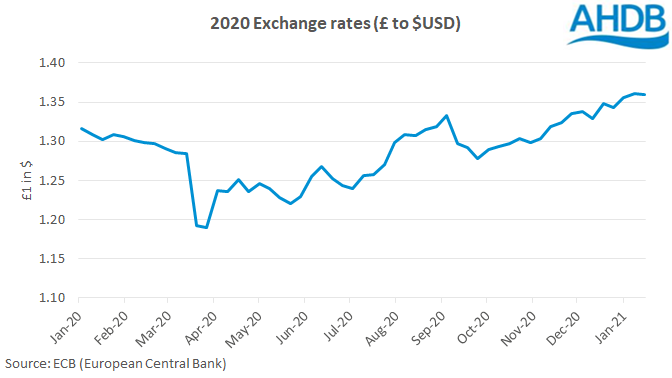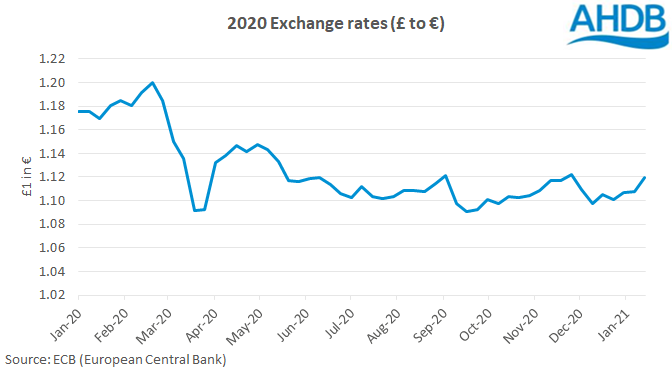What does a weak US dollar mean for the UK livestock sectors?
Wednesday, 20 January 2021
By Charlie Reeve
How did Sterling compare to the Dollar during 2020?
Both Sterling and the Euro have been firming against the US Dollar for several months now. As at 18 January, 1 GBP to USD was 1:1.36. The range in exchange rates during 2020 varied, with the USD ranging from $1.19 when the first lockdown began in the UK, to $1.36 as currently seen now.

What impacts does this have on livestock sectors?
US Dollar
The UK is a net importer of feed ingredients from the United States. With a weakening US Dollar, imported goods from the US entering the UK will appear cheaper due to exchange rates.
To put some context behind this, as at 15 January 2021 US Soybeans were priced at $561/tonne, with the current low exchange rate this converts to around £412. However, if you take the exchange rate from same week last year this would have converted to £431, an increase in excess of £18.
By contrast, exported goods from the UK to the US such as dairy commodities, and UK beef following the new trade deal will be comparatively more expensive to U.S. consumers due to the stronger Sterling.
How did Sterling compare to the Euro during 2020?
Sterling exchange rates to the Euro also had a fairly mixed year. Sterling had several different troughs against the Euro in 2020, driven by a combination of coronavirus pandemic lockdown’s and also political tensions before a deal was finally agreed between the UK and the EU on Christmas Eve.
In 2020, the Euro ranged between €1.090 and €1.199 against the pound, which has in turn had an impact on the relative price of both imported and exported agricultural commodities to and from the continent.

What impacts does this have on livestock sectors?
Euro
The Euro remains fairly strong against Sterling currently. This is likely to help support exported goods, although it may also have a more negative impact on the cost of imported supplies such as fertiliser.
With the UK being a net exporter of lamb to the EU, as a general rule, a weaker sterling compared to the Euro helps make UK sheep meat more price competitive.
Sign up to receive the latest information from AHDB.
While AHDB seeks to ensure that the information contained on this webpage is accurate at the time of publication, no warranty is given in respect of the information and data provided. You are responsible for how you use the information. To the maximum extent permitted by law, AHDB accepts no liability for loss, damage or injury howsoever caused or suffered (including that caused by negligence) directly or indirectly in relation to the information or data provided in this publication.
All intellectual property rights in the information and data on this webpage belong to or are licensed by AHDB. You are authorised to use such information for your internal business purposes only and you must not provide this information to any other third parties, including further publication of the information, or for commercial gain in any way whatsoever without the prior written permission of AHDB for each third party disclosure, publication or commercial arrangement. For more information, please see our Terms of Use and Privacy Notice or contact the Director of Corporate Affairs at info@ahdb.org.uk © Agriculture and Horticulture Development Board. All rights reserved.

